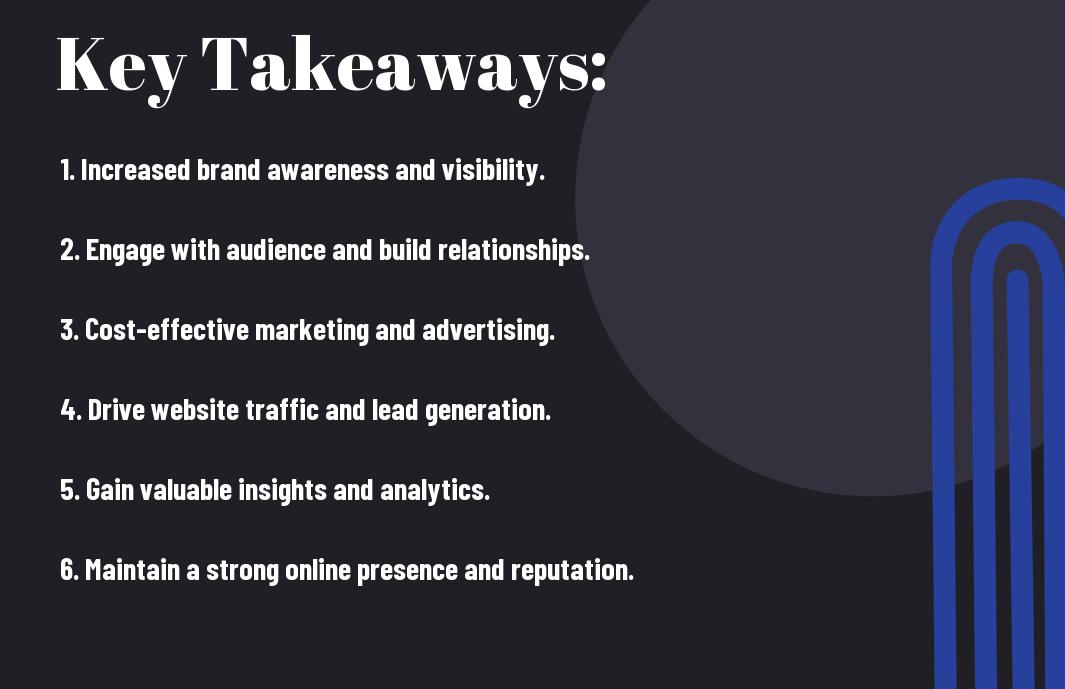Are you struggling to establish a strong online presence for your small business? In today’s digital age, effective social media management is crucial for the success of your business. By utilizing various social media platforms, you can increase brand awareness, build customer relationships, and drive traffic to your website. Additionally, social media management allows you to target specific demographics, analyze consumer behavior, and adjust your marketing strategies accordingly. Without a strong social media presence, your business may be missing out on valuable opportunities to connect with potential customers and expand your reach. It’s time to take advantage of the benefits that social media management can offer for your small business.
Key Takeaways:
- Increased brand awareness: Social media management helps small businesses to reach a wider audience and create brand recognition.
- Engagement with customers: It allows for direct communication with customers and the ability to address their questions and concerns in real-time.
- Improved website traffic: By sharing valuable content and engaging with followers, social media management can drive more traffic to a small business’s website.
- Cost-effective marketing: It provides a cost-effective way for small businesses to promote their products or services and reach potential customers.
- Analytics and insights: Social media management tools offer valuable insights into customer behavior, allowing businesses to tailor their marketing strategies accordingly.

Crafting Your Online Presence
Assuming you understand the importance of social media management for your small business, the next step is to craft your online presence. This involves choosing the right platforms for your business and building a consistent brand image that resonates with your target audience.
Choosing the Right Platforms for Your Business
When it comes to social media management, it’s crucial to choose the right platforms for your business. Not all social media platforms are created equal, and it’s important to focus your efforts on the platforms where your target audience spends their time. Whether it’s Facebook, Instagram, Twitter, or LinkedIn, you need to identify which platforms are most relevant to your business and allocate your resources accordingly. By doing so, you can maximize your reach and engagement with your audience.
Building a Consistent Brand Image
Building a consistent brand image across your social media platforms is essential for establishing trust and credibility with your audience. Consistency in branding helps you stand out and makes it easier for your audience to recognize and remember your business. From your logo and color scheme to your tone of voice and content style, everything should align with your brand’s identity. By maintaining a consistent brand image, you can strengthen your brand’s presence and build a loyal following.
Engagement and Community Building
Now, let’s talk about the importance of engagement and community building on social media for your small business. By actively engaging with your audience and building a community around your brand, you can create a loyal customer base and increase brand awareness. According to a study by Sociallybuzz, the Benefits of Social Media Marketing for Small Businesses in 2021 include improved customer engagement and increased brand loyalty.
Strategies for Increasing Customer Interaction
One effective strategy for increasing customer interaction is to regularly post engaging content such as polls, questions, and interactive stories. Encouraging your followers to share their opinions and experiences with your brand can foster a sense of community and make them feel valued. Additionally, responding to comments and messages in a timely manner shows that you are attentive to your customers’ needs and opinions, further strengthening their loyalty to your brand.
Monitoring and Responding to Customer Feedback
Monitoring and responding to customer feedback is crucial for maintaining a positive online reputation and building trust with your audience. By keeping an eye on comments, reviews, and mentions of your brand on social media, you can address any concerns or issues that arise and show that you take customer feedback seriously. This not only helps to resolve potential problems, but it also demonstrates to your audience that you are committed to providing excellent customer service.

Content Creation and Curation
Keep your social media profiles up-to-date with fresh, engaging content to keep your small business top-of-mind for your audience. By regularly posting on platforms like Facebook, Instagram, and Twitter, you can showcase your products and services, share customer testimonials, and promote special offers. Adding valuable, relevant, and shareable content to your social media pages can help you build brand awareness and attract new customers. For more information on the importance of social media marketing for small businesses, you can read this informative article on The Importance of Social Media Marketing for Small Businesses.
Developing a Content Calendar
Creating and sticking to a content calendar can help you stay organized and ensure that you consistently publish quality content on your social media platforms. By planning your posts in advance, you can strategically align your content with your business goals, promotions, and events. This proactive approach will also allow you to maintain a consistent brand voice and visual aesthetic across all your social media channels, which is crucial for building a strong and recognizable brand identity.
Leveraging User-Generated Content
Encourage your customers to share their experiences with your products or services on social media and use their content to your advantage. User-generated content can be a powerful tool for small businesses, as it not only provides social proof of your offerings but also increases engagement and trust with your audience. When you share customer-generated content, you are not only showcasing your happy customers but also creating a sense of community around your brand. This approach can significantly boost your credibility and influence purchase decisions among potential customers.
Analytics and Adaptation
To effectively manage your small business’s social media, you need to be able to analyze the performance of your posts and adapt your strategy accordingly. This involves tracking key metrics, understanding the data, and making informed decisions based on the insights gained from analytics.
Tools for Measuring Social Media Success
Utilizing tools for measuring social media success is crucial for understanding how well your content is performing. You should consider using platforms like Google Analytics, Facebook Insights, or Twitter Analytics to track metrics such as engagement, reach, and audience demographics. These tools will provide you with valuable data that will help you understand what types of content are resonating with your audience and which ones aren’t. By regularly analyzing this data, you can make informed decisions about the direction of your social media strategy.
Adjusting Your Strategy Based on Data
Once you have gathered insights from your analytics, it’s important to adjust your social media strategy accordingly. If you find that a certain type of content is generating a high level of engagement, you should consider creating more of that content. On the other hand, if you notice that certain posts are consistently underperforming, you can use this information to make necessary changes. Adapting your strategy based on data will help you optimize your social media efforts and improve your overall performance.
The Benefits of Social Media Management for Small Businesses
Following this discussion, it is clear that social media management can greatly benefit your small business. By effectively managing your social media presence, you can increase brand awareness, attract potential customers, and engage with your audience in a meaningful way. Additionally, social media management allows you to track the performance of your posts and analyze the effectiveness of your marketing strategies, helping you make informed decisions to improve your online presence. By utilizing social media management, you can effectively grow your small business and stay ahead of your competition in the digital space.
FAQ: The Benefits of Social Media Management for Small Businesses
Q: What are the benefits of social media management for small businesses?
A: Social media management offers small businesses the opportunity to increase brand awareness, connect with their target audience, drive website traffic, and generate leads. It also provides a platform for engaging with customers and building a loyal community around the brand.
Q: How can social media management help small businesses increase brand awareness?
A: By consistently posting relevant and engaging content, small businesses can increase their visibility and reach on social media platforms. This can lead to more people discovering the brand and becoming potential customers or advocates. Additionally, social media advertising can also help boost brand visibility and reach a wider audience.
Q: What role does social media management play in connecting with the target audience?
A: Social media management allows small businesses to communicate directly with their target audience through posts, comments, and direct messages. It provides a platform for sharing valuable content and engaging in conversations, which can help build relationships and trust with potential customers.
Q: How does social media management drive website traffic for small businesses?
A: By sharing content from their website on social media, small businesses can drive traffic directly to their site. Additionally, social media platforms offer the opportunity to include links in posts and profiles, making it easier for followers to visit the business’s website and explore its products or services.
Q: What are the benefits of generating leads through social media management?
A: Social media management can be used to generate leads through various strategies, such as offering gated content, hosting giveaways, or running targeted ad campaigns. By capturing leads through social media, small businesses can expand their customer base and nurture potential sales opportunities.
